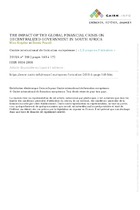| dc.contributor.author | Steytler, Nico | |
| dc.contributor.author | Powell, Derek | |
| dc.date.accessioned | 2019-07-25T08:46:20Z | |
| dc.date.available | 2019-07-25T08:46:20Z | |
| dc.date.issued | 2010 | |
| dc.identifier.citation | Steytler, N., & Powell, D. (2010). The impact of the global financial crisis on decentralized government in South Africa. L'europe En Formation, 358(4), 149. doi: 10.3917/eufor.358.0149 | en_US |
| dc.identifier.uri | http://hdl.handle.net/10566/4745 | |
| dc.description.abstract | Th e global fi nancial crisis has had a severe impact on South Africa.1 Th e
economy went into recession in 2008/09 for the fi rst time in 17 years. Nearly
a million jobs were lost in 2009 alone. Growth has resumed, but the recovery is
fragile, and another recession possible. Rising unemployment and poverty have
placed greater demands on state resources even as revenues contracted, and there
is mounting political pressure on government to review its economic policy.
Th is paper examines the impact of the global fi nancial crisis on South Africa,
in particular on how the highly centralized federal system absorbed and responded
to the crisis. We make two arguments: First, the political implications of the
crisis are far-reaching. | en_US |
| dc.language.iso | en | en_US |
| dc.publisher | L'europe En Formation | en_US |
| dc.subject | Financial crisis | en_US |
| dc.subject | Government | en_US |
| dc.subject | South Africa | en_US |
| dc.subject | Unemployment | en_US |
| dc.subject | Political pressure | en_US |
| dc.title | The impact of the global financial crisis on decentralized government in South Africa | en_US |
| dc.type | Article | en_US |

